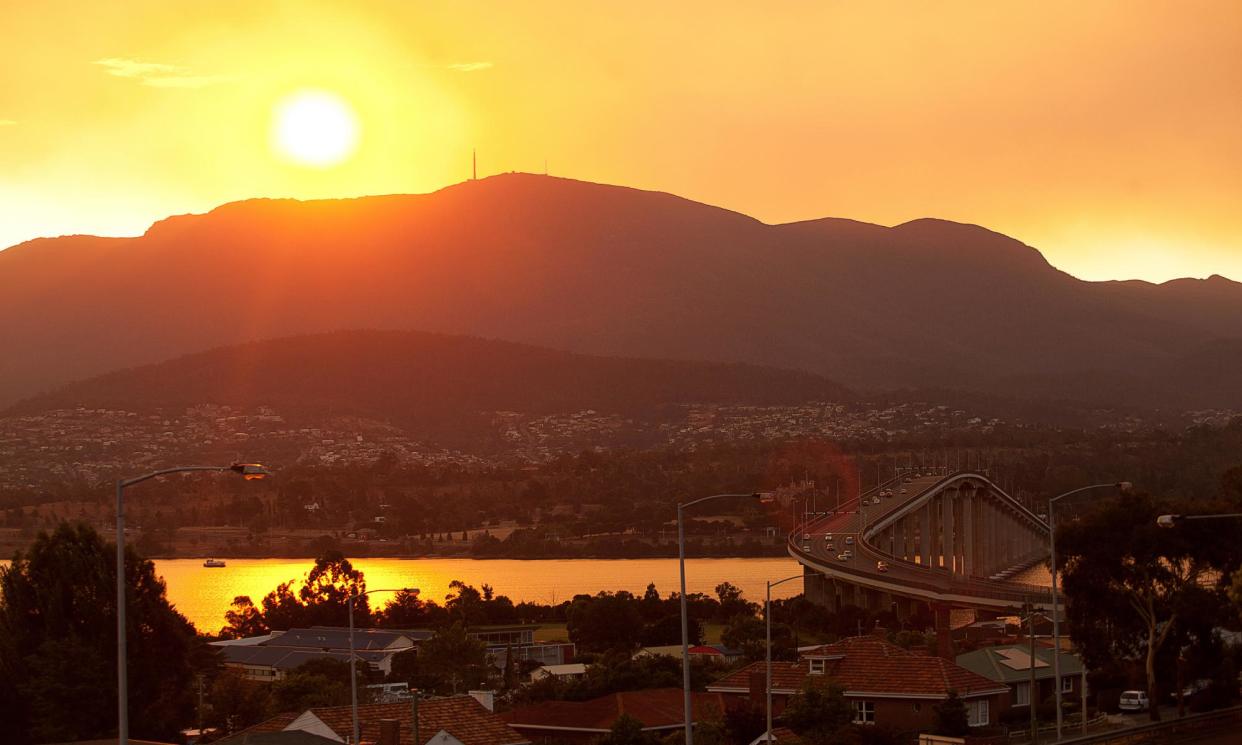Hobart endures hottest night in 112 years as severe heatwave hits south-eastern Australia

Hobart residents sweated through the city’s hottest night in 112 years as a severe heatwave continues to affect large parts of south-east Australia.
Extreme heat is forecast to continue across South Australia, Victoria, Tasmania and southern New South Wales for several days, the Bureau of Meteorology said on Sunday after record temperatures caused the cancellation of long weekend events.
Saturday was the hottest March day on record for Edithburgh on South Australia’s Yorke peninsula (41.7C) and Kanagulk (40.6C) in western Victoria.
The overnight low temperature in Hobart was 24.3C – the warmest night in the Tasmanian capital since 1912, according to the bureau’s records.
Sarah Scully, a senior meteorologist at the bureau, said hot nights were “really unusual” for Hobart, where the mean minimum overnight temperature for March is 11C. She said maximum temperatures were about 10 to 16 degrees above the March average across the heatwave-affected areas.
“It was very hot last night,” Scully said.
“There’s been observed or forecast greater than 37C days for Melbourne for the entire long weekend. [The extreme heat] started [on Saturday] and is expected to continue right through the early hours of Tuesday morning.”
Related: Australia sweats through third-hottest summer on record with hot and dry autumn predicted
Temperatures should ease when a southerly change hits Melbourne and southern Victoria on Tuesday, but the state’s north and parts of South Australia will continue to swelter until Thursday when a “blocking” high-pressure system moves away.
Scully said the blocking high was causing northerly winds and dragging hot air over Australia’s south-east.
“It is unusual to have such intense heatwaves at this time of year, but it’s not unprecedented,” Scully said.
“Autumn is typically the transition season from the heat to the cooler months, so to have heatwaves during the early parts of Autumn [isn’t] unusual.”
Melbourne peaked at 36.9C late on Sunday with Avalon recording 40C and Geelong 39.6C. Temperatures were much cooler in Tasmania as a cold front pushed across the state with Hobart’s maximum temperature of 25.7C recorded before 8am.
Event organisers across south-eastern Australia were sweating over safety concerns and cancellations as the heatwave settled in.
One of the stages at Adelaide’s Womad was closed on Sunday due to the heat while a handful of other events were postponed until night or cancelled as temperatures climbed to almost 40C.
The conditions also prompted the cancellation of the Pitch music and arts festival in regional Victoria.
“Through consultation with authorities, we have been directed to cancel the remainder of Pitch Music & Arts 2024 in light of an updated extreme fire danger warning issued this afternoon for tomorrow,” the organisers said on Sunday afternoon.
“We have consistently followed the guidance of relevant authorities throughout the entire process. Nobody is in immediate danger. We encourage everyone on site not to rush [but] calmly pack up and depart either this evening or early tomorrow.”
Related: Weather tracker: Much of southern Australia on heatwave alert
Melbourne’s Moomba parade was cancelled on Saturday due to concerns for performers and spectators as temperatures soared in Victoria, but the infamous Birdman rally went ahead on Sunday.
“This is a very difficult decision, particularly in Moomba’s 70th year, but we must prioritise people’s health in these extreme conditions,” Melbourne’s lord mayor, Sally Capp, said of the parade being cancelled.
“Participants are required to spend several hours outdoors in hot, heavy costumes – putting them at greater risk.”
Melbourne was tipped to reach a maximum of 37C on Monday, with temperatures in the mid-to-high 30s predicted across most of the state. Adelaide was forecast to hit 38C with hot conditions in the high 30s and low 40s predicted for most regional areas in South Australia.
While the south-east sweltered, people at the opposite end of the country were being confronted by different weather extremes.
In Western Australia, the Eucla, Goldfields and southern interior regions were warned about the possibility of flash flooding and intense rainfall from a rain system that was likely to remain almost stationary for days.
– Additional reporting by Australian Associated Press


